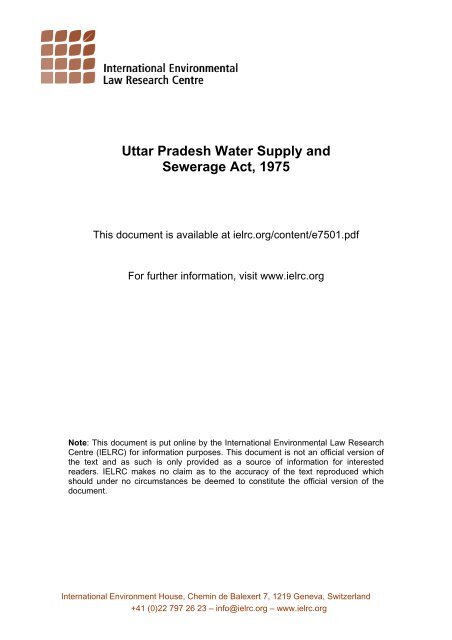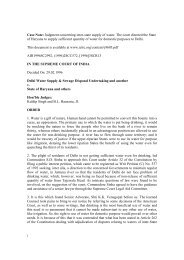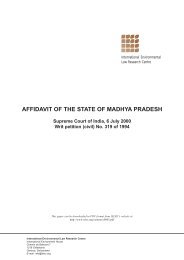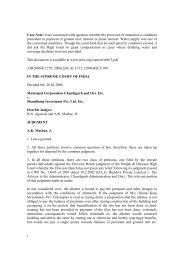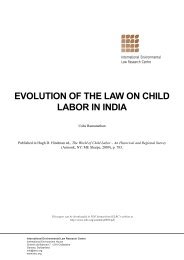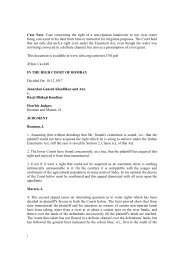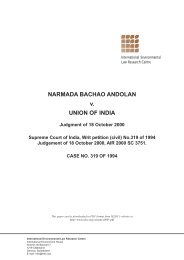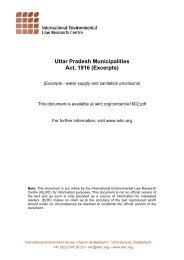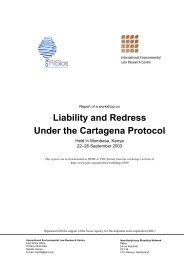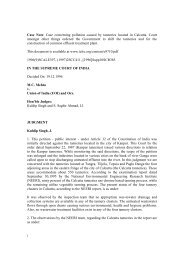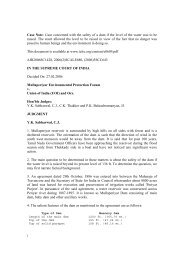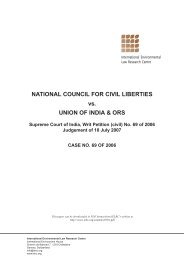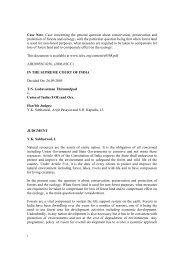Uttar Pradesh Water Supply and Sewerage Act, 1975 - International ...
Uttar Pradesh Water Supply and Sewerage Act, 1975 - International ...
Uttar Pradesh Water Supply and Sewerage Act, 1975 - International ...
Create successful ePaper yourself
Turn your PDF publications into a flip-book with our unique Google optimized e-Paper software.
<strong>Uttar</strong> <strong>Pradesh</strong> <strong>Water</strong> <strong>Supply</strong> <strong>and</strong><strong>Sewerage</strong> <strong>Act</strong>, <strong>1975</strong>This document is available at ielrc.org/content/e7501.pdfFor further information, visit www.ielrc.orgNote: This document is put online by the <strong>International</strong> Environmental Law ResearchCentre (IELRC) for information purposes. This document is not an official version ofthe text <strong>and</strong> as such is only provided as a source of information for interestedreaders. IELRC makes no claim as to the accuracy of the text reproduced whichshould under no circumstances be deemed to constitute the official version of thedocument.<strong>International</strong> Environment House, Chemin de Balexert 7, 1219 Geneva, Switzerl<strong>and</strong>+41 (0)22 797 26 23 – info@ielrc.org – www.ielrc.org
UTTAR PRADESH WATER SUPPLY AND SEWERAGE ACT, <strong>1975</strong>(Excerpts - water supply <strong>and</strong> sanitation provisions)14. Functions of the Jal Nigam.-The functions of the Nigam shall be thefollowing, namely;(i) the preparation, execution, promotion <strong>and</strong> financing the schemes for thesupply of water <strong>and</strong> for sewerage <strong>and</strong> sewage disposal;(ii) to render all necessary services in regard to water supply <strong>and</strong> sewerage to theState Government <strong>and</strong> local bodies, on request to private institutions orindividuals;(iii) to prepare State plans for water supply, sewerage <strong>and</strong> drainage on thedirections of the State Government;(iv) to review <strong>and</strong> advise on the tariff, taxes <strong>and</strong> charges of water supply in theareas of Jal Sansthans <strong>and</strong> local bodies which have entered into anagreement with the Nigam under Section 46;(v) to assess the requirement for materials <strong>and</strong> arrange for their procurement <strong>and</strong>utilisation;(vi) to establish State st<strong>and</strong>ards for water supply <strong>and</strong> sewerage services;(vii) to perform all functions, not stated herein which were being performed bythe Local Self-Government Engineering Department before thecommencement of this <strong>Act</strong>;(viii) to review annually the technical, financial, economic <strong>and</strong> other aspects ofwater supply <strong>and</strong> sewerage system of every Jal Sansthan or local bodieswhich have entered into an agreement with the Nigam under Section 46;(ix) to establish <strong>and</strong> maintain a facility to review <strong>and</strong> appraise the technicalfinancial, economic <strong>and</strong> other pertinent aspect of every water supply <strong>and</strong>sewerage scheme in the State;(x) to operate, run <strong>and</strong> maintain any waterworks <strong>and</strong> sewerage system, if <strong>and</strong>when directed by the State Government, on such terms <strong>and</strong> conditions <strong>and</strong>for such period as may be specified by the State Government;(xi) to assess the requirements for manpower <strong>and</strong> training in relation to watersupply <strong>and</strong> sewerage services in the State;(xii) to carry out applied research for efficient discharge of the functions of theNigam or a Jal Sansthan;(xiii) any other functions entrusted to the Nigam by or under this <strong>Act</strong>; <strong>and</strong>(xiv) such other functions as may be entrusted to the Nigam by the StateGovernment by notification in the Gazette.15. Powers of the Jal Nigam.-(1) The Nigam shall, subject to the provisions ofthis <strong>Act</strong> have power to do anything which may be necessary or expedient for carryingout its functions under this <strong>Act</strong>.(2) Without prejudice to the generality of the foregoing provision, such powershall include the power-(i) to inspect all water supply <strong>and</strong> sewerage facilities in the State by whomsoeverthey are operated;1
(ii) to obtain such periodic or specific information from any local body <strong>and</strong>operating agency as it may deem necessary;(iii) to provide training for its own personnel as well as employees of the localbodies;(iv) to prepare <strong>and</strong> carry out schemes for water supply <strong>and</strong> sewerage;(v) to lay down the schedule of fees for all services rendered by the Nigam tothe State Government, local bodies, institutions or individuals;(vi) to enter into contract or agreement with any person, firm or institution, as theNigam may deem necessary, for performing its functions under this <strong>Act</strong>;(vii) to adopt its own budget annually;(viii) to approve tariffs for water supply <strong>and</strong> sewerage services applicable torespective local areas comprised within the jurisdiction of Jal Sansthans <strong>and</strong>such local bodies as have entered into an agreement with the Nigam underSection 46;(ix) to borrow money, issue debentures to obtain subventions <strong>and</strong> grants <strong>and</strong>manage its own funds;(x) to disburse loans to local bodies for their water supply <strong>and</strong> sewerageschemes;(xi) to incur expenditure <strong>and</strong> to grant loans <strong>and</strong> advances to such persons orauthorities as the Nigam may deem necessary for performing the functionsunder this <strong>Act</strong>.24. Functions of a Jal Sansthan.-The functions of a Jal Sansthan shall be asfollows:(i) to plan, promote <strong>and</strong> execute schemes of <strong>and</strong> operate an efficient system ofwater supply;(ii) where feasible, to plan, promote <strong>and</strong> execute schemes of, <strong>and</strong> operate,sewerage, sewage treatment <strong>and</strong> disposal <strong>and</strong> treatment of trade effluents;(iii) to manage all its affairs so as to provide the people of the area within itsjurisdiction with wholesome water <strong>and</strong> where feasible, efficient sewerageservice;(iv) to take such other measures, as may be necessary, to ensure water supply intimes of any emergency;(v) such other functions as may be entrusted to it by the State Government bynotification in the Gazette.25. Powers of a Jal Sansthan.-(1) Every Jal Sansthan shall, subject to theprovision of this <strong>Act</strong>, have power to do anything which may be necessary or expedientfor carrying out its functions under this <strong>Act</strong>.(2) Without prejudice to the generality of the foregoing provision such powersshall include the power-(i) to exercise all powers <strong>and</strong> perform all the functions relating to water supply,sewerage <strong>and</strong> sewage disposal of the area which lies within its jurisdiction;(ii) to acquire, possess <strong>and</strong> hold l<strong>and</strong>s <strong>and</strong> other property <strong>and</strong> to carry any wateror sewerage works through, across, over or under any highway, road, streetor place <strong>and</strong>, after reasonable notice, in writing to the owner or occupier,into, through, over or under any building or l<strong>and</strong>.(iii) to abstract water from any natural source <strong>and</strong> dispose of waste water;2
(iv) to enter into contract or agreement with any person or body as the JalSansthan may deem necessary;(v) to adopt its own budget annually;(vi) to introduce or amend tariff for water supply <strong>and</strong> sewerage services, subjectto approval of the Nigam <strong>and</strong> collect all taxes <strong>and</strong> charges for these servicesas may be prescribed;[Provided that not decision to introduce or amend such tariff shall be taken exceptby a special resolution in that behalf brought after giving such notice as maybe prescribed, <strong>and</strong> passed by the majority of two-thirds of the members ofthe Jal Sansthan;](vii) to incur expenditure <strong>and</strong> manage its own funds;(viii) to obtain loans, advances, subventions <strong>and</strong> grants from the Nigam.3
CHAPTER VIIWATER SUPPLY65. Definition of supply of water for domestic purposes.-The supply of waterfor domestic purposes under this <strong>Act</strong> means supply for any purpose except thefollowing, namely:(a) for any trade, manufacture or business;(b) for gardens or for purposes of irrigation;(c) for building purposes including construction of streets;(d) for fountains, swimming baths, public baths or tanks or for any ornamental ormechanical purpose;(e) for animals, where they are kept for sale or hire or for the sale or theirproduce;(f) for the consumption <strong>and</strong> use at a restaurant or by inmates of hotel, boardinghouse or residential club;(g) for the consumption <strong>and</strong> use by the persons resorting to theatres <strong>and</strong> cinemas;(h) for watering streets; or(i) for washing vehicles where they are kept for sale or hire.66. <strong>Supply</strong> of water by Jal sansthan.-(1) A Jal Sansthan shall, on an applicationmade in that behalf by the owner or occupier of any premises, grant supply of waterfor domestic purposes for-(a) any premises situated within a distance of thirty metres from an existing main;or(b) where the applicant undertakes to bear the cost any extension which may benecessary beyond a distance of thirty metres for connecting the premises withthe nearest existing main, any premises situated beyond such distance.Explanation.—The Jal Sansthan shall bear the cost of extension only inrespect of so much distance, not exceeding thirty metres, as is sufficient toconnect the nearest existing main with the outer limit of the premises.(2) Notwithst<strong>and</strong>ing that the cost of any extension has been borne under clause(b) of sub-section (1) by the person to whom water is supplied, the propertytherein shall vest in the Jal Sansthan.(3) The Jal Sansthan may on an application made in that behalf, grant supply ofwater for any purposes other than domestic purposes.(4) The supply of water for domestic or other purposes shall be subject to suchterms <strong>and</strong> conditions as may be provided by bye-laws.(5) Notwithst<strong>and</strong>ing anything in the bye-laws referred to in sub-section (4) theJal Sansthan may supply water to the Government or any local authority or otherstatutory corporation or to any educational institution on such terms as to payment<strong>and</strong> as to the period <strong>and</strong> the conditions of supply as may be agreed upon.67. <strong>Water</strong> supply for domestic purposes not to be used for non-domesticpurposes.—No person shall, except in such circumstances or subject to suchconditions as may be provided by bye-laws use or allow to be used water suppliedfor domestic purposes, for any other purpose.68. Provision of fire hydrants.—(1) The Jal Sansthan may, at the request <strong>and</strong>expense of the owner or occupier of any factory (as defined in the Factories <strong>Act</strong>,4
1948) or any shop or commercial establishment (as defined in the <strong>Uttar</strong> <strong>Pradesh</strong>Dookan Aur Vanijya Adhishthan Adhiniyam, 1962) provide <strong>and</strong> maintain firehydrants together with all incidental work, for the supply of water in case of fire insuch factory, shop or commercial establishment <strong>and</strong> in any such case charge fromsuch owner or occupier the cost of water supplied in connection therewith.(2) The Jal Sansthan shall provide <strong>and</strong> maintain fire hydrants together with allincidental works for the supply of water in case of fire, at all such other places as itmay consider necessary, <strong>and</strong> supply water in connection therewith.69. Power to provide water meters.—(1) The Jal Sansthan may provide awater meter <strong>and</strong> attach the same to the service pipe in premises connected withwaterworks of the Jal Sansthan.(2) The expenses of installation <strong>and</strong> the rent to be payable for the use of ameter shall be paid by the consumer.(3) The provision of meters or the transfer of connection thereof <strong>and</strong> their use,maintenance <strong>and</strong> testing <strong>and</strong> the expense of installation <strong>and</strong> their rents <strong>and</strong> thefurnishing of security, if any, in connection therewith shall be regulated by byelawsmade in that behalf.70. Licensed plumbers.—(1) No person other than a plumber licensed by theJal Sansthan (hereinafter referred to as a licensed plumber) shall execute any workin respect of a water connection not being a work of a trivial nature <strong>and</strong> no personshall permit any such work to be executed by a person other than a licensedplumber.(2) When any work is executed in contravention of the provisions of sub-section(1), such work shall be liable to be dismantled at the discretion of the Jal Sansthan.71. Prohibition of wastage of water.—(1) No owner or occupier of anypremises to which water is supplied by the Jal Sansthan shall cause or suffer anywater to be wasted, or cause or suffer the service pipe or any tap or other fitting orwork connected therewith to remain out of repair so as to cause wastage of water.(2) Whenever the Jal Sansthan has reason to believe that as a result of defect in aservice pipe or tap or other fitting or work connected therewith water is being wasted,the Jal Sansthan may by written notice require the consumer to repair <strong>and</strong> make goodthe defect within such time as may be specified.(3) If such repair is not carried out within the time specified the Jal Sansthanmay, without prejudice to any action against the consumer under any other provisionof this <strong>Act</strong>, cause such repair to be made, <strong>and</strong> the cost of such repairs shall berealised from the consumer.72. Power to cut off water supply.-The Jal Sansthan may cut off the watersupply from any premises—(a) if any tax, fee, rental, cost of water or any charge or other sum due under this<strong>Act</strong>, is not paid within a period of fifteen days after service of a bill for thesame; or(b) if after the receipt of a written notice from the Jal Sansthan requiring him torefrain from so doing, the consumer continues to use the water or to permit thesame to be used in contravention of the provisions of this <strong>Act</strong> or any rule orregulations or bye-laws made thereunder;(c) if the consumer damages or causes to be damaged the water meter or anyconnection pipe or ferrule; or5
(d) if the consumer refuses to admit any officer or servant of a Jal Sansthan dulyauthorised in this behalf into the premises which he proposes to enter for thepurpose of executing any work or placing or removing any apparatus or ofmaking any examination or enquiry in connection with the water supply orprevents any such officer or servant from executing any work or placing orremoving any apparatus or making such examination or enquiry; or(e) if the service pipe or any tap or other fitting or work connected therewith isfound on examination by an officer or servant of the Jal Sansthan dulyauthorised in this behalf to be out of repair to such an extent as to causewastage or contamination of water <strong>and</strong> immediate prevention thereof isnecessary; or(f) if the consumer causes or allows to be caused the service pipe on any tap orother fitting or work connected therewith to be placed removed, repaired orotherwise interfered with, in contravention of the provisions of this <strong>Act</strong> or ofthe rules or regulation or bye-laws made thereunder; or(g) if by reason of leakage in the service pipe or any tap or other fitting or work,damage is caused to a public street <strong>and</strong> immediate prevention thereof isnecessary;(h) if the consumer does not allow the Jal Sansthan to install meter on his waterconnection or refuses to deposit security for the supply of meter.](2) No action taken under or in pursuance of this section shall relieve a personfrom any penalty or liability which he may otherwise have incurred.(3) The Jal Sansthan may reconnect the supply of water disconnected under subsection(1) on payment of such charges <strong>and</strong> on such terms <strong>and</strong> conditions as may beprovided by bye-laws.73. Prohibition of certain acts.—(1) No person shall—(a) wilfully obstruct any person acting under the authority of the Nigam or a JalSansthan in setting out the lines of any work or pull up or remove any pillar,post or stay fixed in the ground for the purpose of setting out the lines of suchworks, or deface or destroy any works made for the said purpose; or(b) wilfully or negligently break, injure, turn on, open, close, shut off or otherwiseinterfere with any lock, valve, pipe, meter or other work or apparatusbelonging to the Nigam or a Jal Sansthan; or(c) unlawfully obstruct the flow of or flush, draw off, or divert, or take water fromany waterworks belonging to the Nigam or a Jal Sansthan or any water courseby which any such water is supplied; or(d) obstruct any officer or other employee of the Nigam or a Jal Sansthan in thedischarge of his duties under this Chapter or refuse or wilfully neglect tofurnish him with means necessary for the making of any entry, inspection,examination or enquiry thereunder in relation to any water-works; or(e) bathe in, at or upon any waterworks, or wash or throw or cause to enter thereinany animal or throw any rubbish, dirt or filth into any waterworks, or cleantherein any cloth, wool or leather or the skin of any animal, or cause water ofany sink, or drain or any steam engine or boiler or any other polluted water toturn or be brought into any waterworks, or do any other act whereby the waterin any waterworks, is fouled or likely to be fouled.6
(2) Nothing in clause (b) or sub-section (1) shall apply to a consumer closing thestop-cock fixed on the service pipe supplying water to his premises so long as heobtained the consent of any other consumer whose supply be affected thereby.Chapter VIIISEWERAGE74. Right of owner or occupier to obtain sewer connection.—The owner oroccupier of any premises shall be entitled to empty sewage of the premises into asewer of a Jal Sansthan provided that, before doing so, he,—(a) obtains written permission of the Jal Sansthan <strong>and</strong> pays connection fee inaccordance with the bye-laws; <strong>and</strong>(b) complies with such other conditions as may be provided by bye-laws.75. Power to require owner to have sewer connection.—Where any premisesare, in the opinion of a Jal Sansthan, without sufficient means of effectual disposal ofsewage <strong>and</strong> the sewer of the Jal Sansthan is situated at a distance of fifty metres fromany part of the premises, the Jal Sansthan may, by written notice, require the owner ofthe said premises to have sewer connection as provided by bye-laws.76. Prohibition of connection with sewer.—No person shall without thepermission of the Jal Sansthan make or cause to be made any connection orcommunication with any sewer of the Jal Sansthan.77. Prohibition of construction of building over sewer.—(1) No person shallwithout the permission of the Jal Sansthan construct any private street, building orother structure on any sewer of the Jal Sansthan.(2) The provisions of Sections 327 <strong>and</strong> 333 of the <strong>Uttar</strong> <strong>Pradesh</strong> NagarMahapalika Adhiniyam, 1959, shall mutatis mut<strong>and</strong>is apply in relation to anyconstruction in contravention of sub-section (1) with the substitution of references tothe Mukhya Nagar Adhikari by references to such officer of the Jal Sansthan as itmay, by general or special order, specify in that behalf.78. Power to affix shaft etc., for ventilation of sewer cesspool.—A Jal Sansthanmay, for the purposes of ventilating any sewer or cesspool, whether vested in the JalSansthan or not, erect upon any premises or affix to the outside of any building, or toany tree any shaft or pipes as may appear to it to be necessary.79. Power to examine <strong>and</strong> test sewer etc., believed to be defective.—(1) Whereit appears to the Jal Sansthan that there are reasonable grounds for believing that aprivate sewer or cesspool is in such condition as to be prejudicial to health or to be anuisance or that a private sewer communicating directly or indirectly with a sewer ofthe Jal Sansthan is so defective as to admit sub-soil water or grit or other material itmay examine its condition <strong>and</strong> for that purpose may apply any test, not being a test bywater under pressure, <strong>and</strong> if it deems it necessary, open the ground.(2) (a) If on examination the sewer or cesspool is found to be in proper condition,the Jal Sansthan shall as soon as possible, reinstate any ground which has beenopened by it <strong>and</strong> determine any pay compensation for the damage caused by it.(b) If on the other h<strong>and</strong>, the sewer or cesspool so examined is found to bedefective, the Jal Sansthan may forthwith stop its functioning or disconnect it from thesewer of the Jal Sansthan, or require the owner or occupier to take remedial action asdirected <strong>and</strong> within a time specified, by the Jal Sansthan <strong>and</strong> in any such event the JalSansthan may recover the cost incurred by it from the owner or occupier, as the casemay be.7
(3) In case of dispute as to the sufficiency of the amount so determined, the JalSansthan shall refer the dispute to the Nigam whose decision thereon shall be final.80. Prohibition of certain acts.—(1) No person shall—(a) wilfully obstruct any person acting under the authority of the Jal Nigam or aJal Sansthan under this Chapter in setting out the lines of any works or pullup or remove any pillar, post or stay fixed in the ground for the purpose ofsetting out the lines of such work or deface or destroy any works made for thesaid purpose; or(b) wilfully or negligently break, injure, turn on, open, close, shut-off orotherwise interfere with any lock, valve, pipe or other works or apparatusbelonging to the Nigam or a Jal Sansthan <strong>and</strong> pertaining to its functions underthis Chapter; or(c) unlawfully obstruct the flow of, or flush, draw off or divert or take sewagefrom any work belonging to the Nigam or a Jal Sansthan; or(d) obstruct any officer or other employee of the Nigam or Jal Sansthan indischarge of his duties under this Chapter or refuse or wilfully neglect tofurnish him with means necessary for the making of any entry, inspection orenquiry thereunder in relation to any sewage works.81. Power of entry, survey etc.—(1) Any officer of the Nigam or a Jal Sansthanauthorised by it in that behalf may, with or without assistants, or workmen, enter intoor upon any premises in order—(a) to make any inspection, survey, measurement, valuation or inquiry;(b) to take level;(c) to dig or bore into the sub-soil;(d) to set out boundaries <strong>and</strong> intended lines of work;(e) to mark such levels, boundaries <strong>and</strong> lines by placing marks <strong>and</strong> cuttingstrenches; or(f) to do any other thing necessary for the purposes of this <strong>Act</strong> or any rule orregulation or bye-law:Provided that—(i) no such entry into a building shall be made between sunset <strong>and</strong> sunrise;(ii) no dwelling house or place shall be so entered, except with the consent ofthe occupier thereof, without giving the occupier at least twenty-fourhours notice of the intention to make such entry;(iii) reasonable opportunity <strong>and</strong> facility shall be allowed to the womenoccupying any part of a dwelling house to withdraw; <strong>and</strong>(iv) due regard shall, so far as feasible, be had to the social <strong>and</strong> religioususages of the occupants of the premises, entered into.(2) Whenever any officer of the Nigam or a Jal Sansthan authorised under subsection(1) enters into or upon any premises in pursuance of that sub-section he shall,at the time of such entry pay or tender payment for the damage, if any, to be causedby any act as aforesaid <strong>and</strong> in case of dispute as to the sufficiency of the amount ofcompensation, such dispute shall in the case of Nigam be referred to the Chairman ofthe Nigam <strong>and</strong> in the case of a Jal Sansthan be referred to the Chairman of the JalSansthan.8
(3) When any person is entitled to enter into or upon any premises in exercise ofthe powers under sub-section (1) he may also enter in similar manner into or uponany adjoining premises for any work authorised by or under this <strong>Act</strong> or for thepurpose of depositing therein, any soil, grindstone or other materials or for obtainingaccess to such work or for any other purposes connected with the execution of thesame.(4) It shall be lawful for any officer authorised in this behalf by the Nigam or a JalSansthan to make any entry into any place to open or cause to be opened any door,gate or other barrier—(a) if he considers the opening thereof necessary for the purpose of such entry;<strong>and</strong>(b) if the owner or occupier is absent or being present refuses to open such door,gate or barrier.(5) The officer so authorised shall, in exercise of any power conferred by subsection(4) do as little damage as may be possible <strong>and</strong> compensation for such damageshall be payable by the Nigam or a Jal Sansthan, as the case may be, to the owner oroccupier of such premises or to both, <strong>and</strong> in case of any dispute as to the sufficiencyof the amount of compensation, the dispute shall in the case of the Nigam be referredto the Chairman of the Nigam <strong>and</strong> in the case of a Jal Sansthan be referred to theChairman of the Jal Sansthan.82. Power to disinfect tanks, pools <strong>and</strong> wells.—(1) Any officer authorised bythe Nigam or a Jal Sansthan in that behalf may have any tank, pool, or well, cleanedor disinfected after notices to the owner or occupier, if any, when it appears that suchcleaning or disinfection will prevent or check the spread of any dangerous disease.(2) The cost of cleaning or disinfection referred to in sub-section (1) shall berecoverable from the owner or occupier of such tank, pool or well.9


